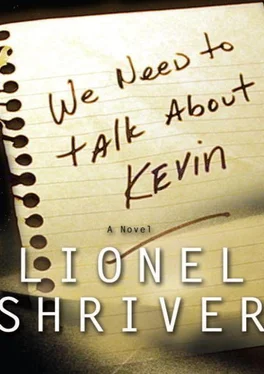At the very least, I wish I’d stuck to my guns on our child-care arrangements. We’d hired Robert, that seismology student from Lamont-Doherty Earth Observatory, to pick up Celia from school and stick around the house until one of us got home, and that’s the way the rules should have stayed. Against all odds, we managed to keep Robert, too—though he threatened to quit—once we assured him that Kevin was now old enough to look after himself and he need only look after Celia. But you were on this responsibility kick. Kevin was fourteen, as old as many sitters in our neighborhood. If Kevin was to become trustworthy, he had first to be trusted; sure, it sounded good. So you told our child-minder that as long as Kevin had returned from ninth grade and had been apprised that he was now to keep an eye on Celia, Robert could go. That solved the problem that kept cropping up, that you would get stuck in traffic and I would work a bit late, and (however well-compensated for his time) Robert would get stranded, chafing, on Palisades Parade when he had research at Lamont to which he needed to return.
When I try to remember that Monday, my mind shies, like ducking a hurtling tether ball. Then the memory curves centrifugally back around again, so that when I stand back up it hits me in the head.
I was once more working a little late. The new arrangement with Robert made me feel less guilty for putting in an extra hour, and AWAP’s preeminence in the budget-travel niche had started to slide. We had so much more competition than when I started out— The Lonely Planet and The Rough Guide had sprung up; meanwhile, with the whole country aslosh in cash from a buoyant stock market, demand for the really dirt-cheap travel in which we specialized had dropped. So against my better judgment, I was working up a proposal for a whole new series, Wing and a Prayer for Boomers —whose target audience would be flush with Internet start-up stock, probably overweight, nostalgic about their first seat-of-the-pants trip to Europe with a beat-up copy of W&P in the sixties, convinced they were still college students if not in fact then in spirit, accustomed to $30 cabernets but, by conceit, still adventurous, that is, eager for comfort so long as that’s not what it was called and by all means in horror of resorting to the stodgy Blue Guide like their parents—when the phone rang.
You said to drive carefully. You said that she was already in the hospital and there was nothing I could do now. You said that her life was not endangered. You said that more than once. All this was true. Then you said that she was going to be “all right,” which was not true, though for most messengers of dismal tidings the urge to issue this groundless reassurance seems to be irresistible.
I had no choice but to drive carefully, because the traffic on the George Washington Bridge was barely moving. When at last I laid eyes on your collapsed expression in the waiting room, I realized that you loved her after all, which I castigated myself for ever having doubted. Kevin wasn’t with you, to my relief, because I might have clawed his eyes out.
Your embrace had rarely offered so little solace. I kept hugging you harder to get something out of it, like squeezing an empty bottle of hand lotion until it wheezes.
She was already in surgery, you explained. While I’d driven in, you’d run Kevin home, because there was nothing to do but wait, and there was no point making this harder on her brother than it was already. But I wondered if you hadn’t whisked him from the waiting room to safeguard him from me.
We sat in those same sea-green metal chairs where I had agonized over what Kevin would tell the doctors when I broke his arm. Maybe, I supposed miserably, for the last eight years he’d been biding his time . I said, “I don’t understand what happened.” I was quiet; I didn’t shout.
You said, “I thought I told you. Over the phone.”
“But it doesn’t make sense.” Anything but contentious, my tone was simply baffled. “Why would she—what would she be doing with that stuff?”
“Kids.” You shrugged. “Playing. I guess.”
“But,” I said. “She’ll, ah—.” My mind kept blanking out. I had to reconstruct what I’d wanted to say all over again, repeating the conversation to myself, where we were, what came next…. Bathroom. Yes.
“She’ll go to the bathroom by herself now,” I resumed. “But she doesn’t like it in there. She never has. She wouldn’t play in there.” An incipient insistence in my voice must have sounded dangerous; we would shrink back from the ledge. Celia was still in surgery. We wouldn’t fight, and you would hold my hand.
It seemed hours later that the doctor emerged. You’d called home on your cell phone, twice, out of my earshot as if sparing me something; you’d bought me coffee from the machine along the wall, and it was now topped with crinkled skin. When a nurse pointed us out to the surgeon, I suddenly understood why some people worship their doctors, and why doctors are prone to feel godlike. But with one look at his face, I could see that he wasn’t feeling very godlike.
“I’m sorry,” he said. “We really tried. But there was too much damage. I’m afraid we couldn’t save the eye.”
We were encouraged to go home. Celia was heavily sedated, and she would remain so for some time. Not long enough, I thought. So we stumbled from the waiting room. At least, you pointed out numbly, he says the other eye is probably okay. Just that morning I’d taken for granted the fact that our daughter had two.
Out in the parking lot, it was cold; in my flight from the office, I’d left my coat. We had two cars to drive home, which made me feel colder. I sensed we were at a junction of sorts and feared that if we each launched off in separate vehicular universes we would end up in the same place only in the most banal, geographical sense. You must have felt the same need to confirm that we were, as my staff had lately taken to saying five times a day, on the same page , because you invited me into your truck for a few minutes to debrief and get warm.
I missed your old baby-blue pickup, which I associated with our courtship, powering along the turnpike with the windows down and sound system pounding, like a living Bruce Springsteen lyric. And the pickup was more you, old-you anyway: classic, down-home, honest. Pure, even. Edward Hopper would never have painted the bulky 4x4 with which you replaced it. Reared up unnaturally above wide, oversized tires, the body had the blunted, bulging contours of an inflatable dinghy. Its bullying fenders and puffed-up posture reminded me of those poor little lizards whose only weapon is display, and the truck’s overdrawn, cartoon manliness had prompted me to quip in better days, “If you check under the chassis, Franklin, I bet you’ll find a tiny dick.” At least you’d laughed.
The heating worked well; too well, since once we’d idled for a few minutes the cab got stuffy. It was bigger than the Ford, but your baby-blue had never felt this claustrophobic with just the two of us.
Finally, you knocked your head back on the padded headrest and stared at the ceiling. “I can’t believe you left it out.”
Stunned, I didn’t respond.
“I thought about not saying that,” you proceeded. “But if I swallowed it, I’d be not saying it, and not saying it, for weeks, and that seemed worse.”
I licked my lips. I had begun to tremble. “I didn’t leave it out.”
You dropped your head, then sighed. “Eva. Don’t make me do this. You used that Liquid-Plumr on Saturday. I remember because you went on about how the kids’ drain smelled weird or something, and then later that afternoon you warned us not to run any water in that sink for the next hour because you’d put drain cleaner in it.”
Читать дальше












